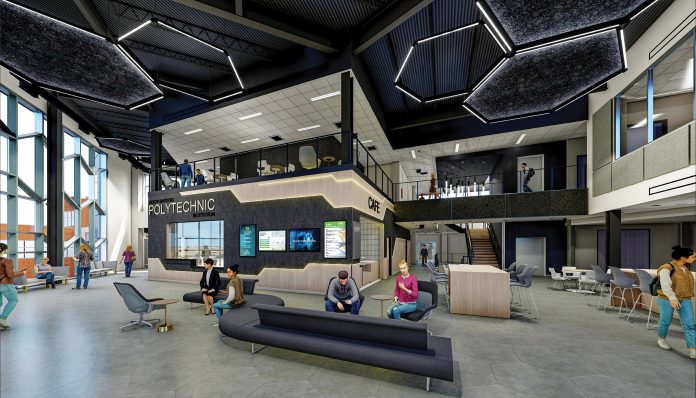In 2018, the North Dakota State Board of Higher Education designated Bismarck State College (BSC) as the state’s first and only polytechnic institution. The North Dakota Legislature provided $38 million for the construction of a new polytechnic education center and for the start-up of new academic programs focused on meeting workforce needs. In December 2021, BSC announced the building of this facility, which is scheduled to open in late 2024 or early 2025.
What is a Polytechnic Institution?
With only a small percentage of educational institutions in the country carrying this designation, many North Dakotans are asking, what is a polytechnic institution?
Simply put, a polytechnic institution is a university or college dedicated to the instruction of various technical arts and applied sciences using an educational model that engages students and industry with hands-on learning to develop workforce-ready knowledge, skills and degrees. This unique model allows students to combine multiple academic programs and skill sets to create customized college degrees embedded with industry-recognized credentials that are flexible and adaptable to meet the needs of both the student and industry.
A polytechnic institution combines the in-depth theory typically found at universities with practical career and technical education usually found at community or technical colleges. The focus is on offering a wide variety of certificate, associate and bachelor’s degree programs with fewer admission requirements, smaller class sizes and lower tuition. Students advance their education and skills at their own pace and can even earn college credits and industry-specific certificates while in high school or the workforce. Those earned credits and certificates are stackable toward Associate of Applied Science and/or Bachelor of Applied Science degrees.
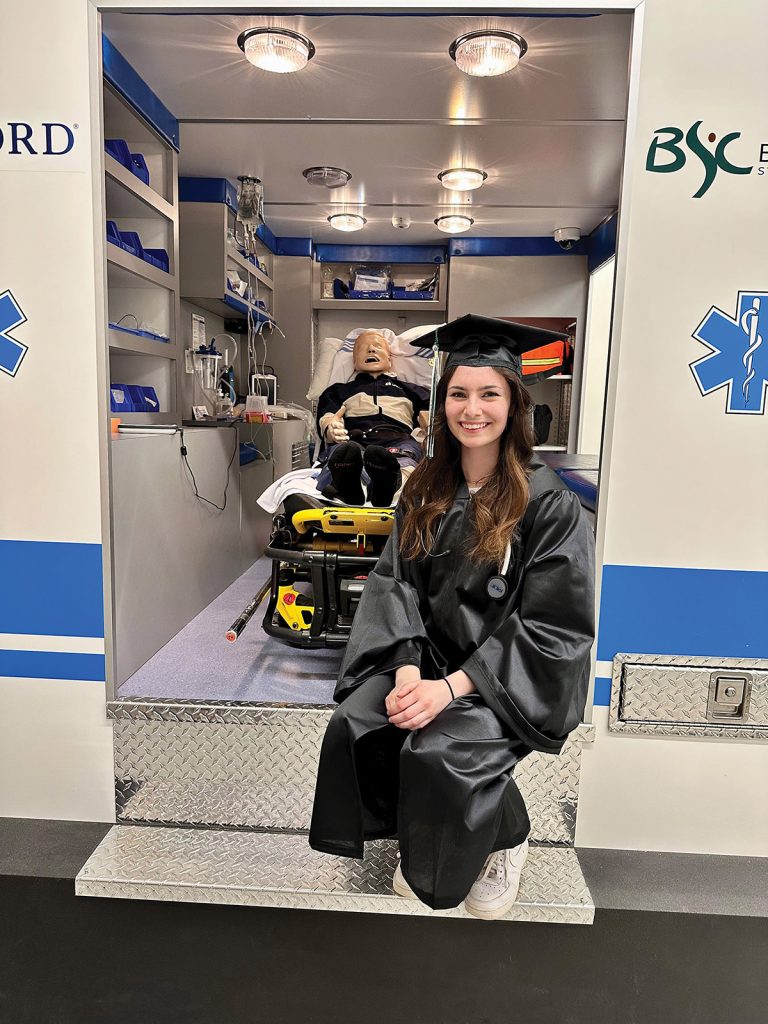
At Bismarck State College’s 83rd Commencement Ceremony in May 2023, eight high school students graduated with a degree from BSC prior to graduating from high school, including Aurora Hill (above), a Bismarck High School junior, who walked across the stage to receive her Emergency Medical Technician degree.
Breaking Ground
In November 2022, BSC broke ground on the region’s only polytechnic education facility. In fact, the closest peer institution is in Wisconsin. BSC’s state- of-the-art center will feature project-based learning and nontraditional, hands-on, collaborative working environments.
“Having an institution align itself on the polytechnic mission, which is based on a hands-on, real-world, team-based learning, driven by the private sector, nothing can be more powerful,” said North Dakota Governor Doug Burgum at the groundbreaking ceremony. Burgum has prioritized workforce development in the state. “If we have the workforce in North Dakota, the companies will come.”
Designed by North Dakota-based ICON Architectural Group, the 88,000-square-foot polytechnic education center will connect to the west side of the BSC National Energy Center of Excellence (NECE) via a skywalk. The new facility will contain learning areas including a Security Operations Center (SOC); artificial intelligence (AI) and virtual reality labs; flex labs, where business and industry can partner on developing projects and ideas; spaces for operating and building new programming and for program equipment to advance applied research; a Digital Hive; collaboration spaces; and a live-event venue. Situated between the BSC Armory and NECE, this new facility will also have a spectacular view of the Missouri River.
SOC & Digital Hive
Inside the new facility, BSC will offer two unique digital technology environments with a mission to promote and advance the digital and gig economy: the Security Operations Center (SOC) and the Digital Hive.
The student-operated SOC is designed to train students in cybersecurity, giving them a near “real- world” hands-on experience as security analysts and security engineers under the leadership of a SOC manager. Students pursuing cybersecurity degrees will participate in the operation of SOC operations and debriefing activities after live operation events, maximizing their employability as cybersecurity professionals. Beginning with a basic design, the SOC will continue to mature, develop and expand based on the cybersecurity industry’s needs—including future membership in the Multi-State Information Sharing and Analysis Center (MS-ISAC), which is the trusted resource for cyberthreat prevention, protection and recovery for U.S., state, local, tribal and territorial government entities.
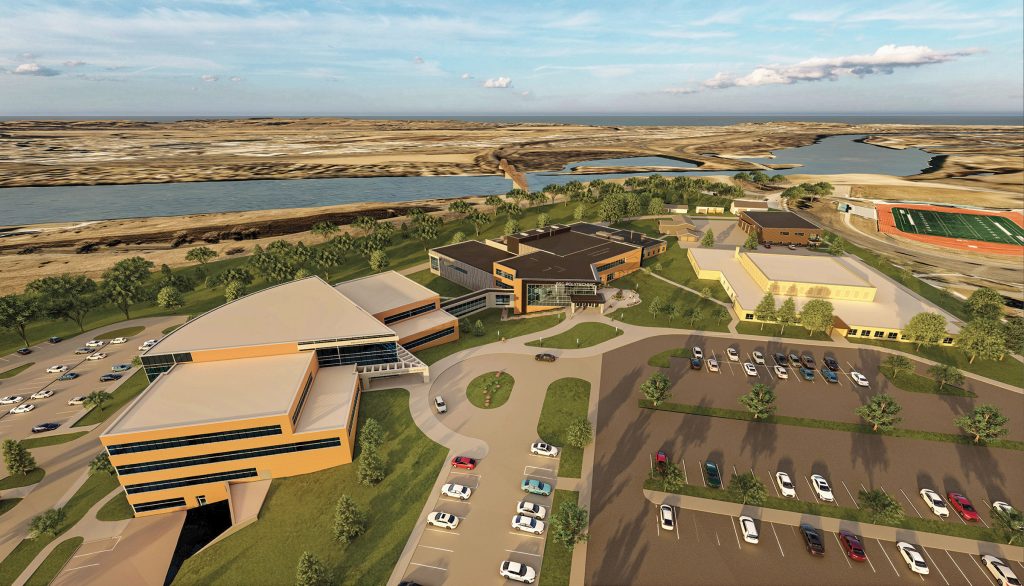
The polytechnic education center will connect to the west side of the BSC National Energy Center of Excellence (NECE) via a skywalk. Situated between the BSC Armory and NECE, the facility features a beautiful view of the Missouri River. Cameras mounted atop NECE and the BSC Armory are capturing time- lapse videos of the construction progress, and the videos are updated monthly at bismarckstate.edu/FromTheGroundUp.
Also inside the new polytechnic education facility will be the Digital Hive, an environment designated to bring digital creators, designers, engineers and entrepreneurs of various backgrounds together to design and create future technologies. The Digital Hive’s goal is to increase the entrepreneurship potential for the highly skilled, digital talent needed in our region. Open to the community as well as students, the Digital Hive will link talent to opportunity by creating network opportunities and providing a collaborative environment that embraces curiosity and fosters new ideas and innovation. The Digital Hive will empower students and community participants to explore interests, discover passions and strengthen their minds, thereby creating a talent pipeline to fuel the current and future economy, including the emerging gig economy.
Why Polytechnic Education?
The fundamental principle that sets a polytechnic institution such as BSC apart from traditional institutions is hands-on, applied learning. Here’s a closer look at how learners benefit from a polytechnic education:
▪ Flexible Learning Pathways
While traditional university courses focus on academic disciplines, such as English, math and history, polytechnic institutions focus on fusing technologies with applied learning in high- demand occupations in a variety of fields ranging from manufacturing, energy and agriculture to cybersecurity and health sciences. In addition to traditional undergraduate degrees, a polytechnic institution such as BSC also provides learners with opportunities to gain industry experience and earn industry-recognized credentials, certifications, certificates and degrees with apprenticeship options.
Polytechnic education is flexible. Many BSC programs share the same foundational core curriculum, giving students options to pursue short-term certificates, traditional associate degrees or customized stackable degrees. Part-time options, online/hybrid learning, and more evening and weekend programming provide even more flexibility for learners who want to upgrade their skills without sacrificing their personal lives or careers.
Flexibility is attractive to learners because each career pathway is customizable to meet each student’s needs, offering a seamless transition from K-12 to higher education to industry at a considerable cost-saving.
▪ Real-World Experience
It’s not uncommon for colleges and universities to offer internship programs, but a polytechnic institution goes further by introducing students to real-world experiences early in their education— both inside and outside the classroom. BSC actively integrates work-based learning into all degree options and encompasses many opportunities in collaboration with business and industry, including service learning, project-based learning, apprenticeships, internships, field experiences and clinicals. Students apply their newly acquired skills through industry-sponsored projects that solve industry issues and improve efficiencies.
To ensure students are well-rounded and more marketable to employers, BSC focuses on giving students a solid foundation in STEAM, and the concepts from STEAM disciplines are woven throughout programs to align with business and industry demands.
Because of this, learners at a polytechnic institution are workforce ready on graduation day. They have gained valuable experiences, acquired the career- readiness skills required to be marketable and graduate with a competitive advantage.
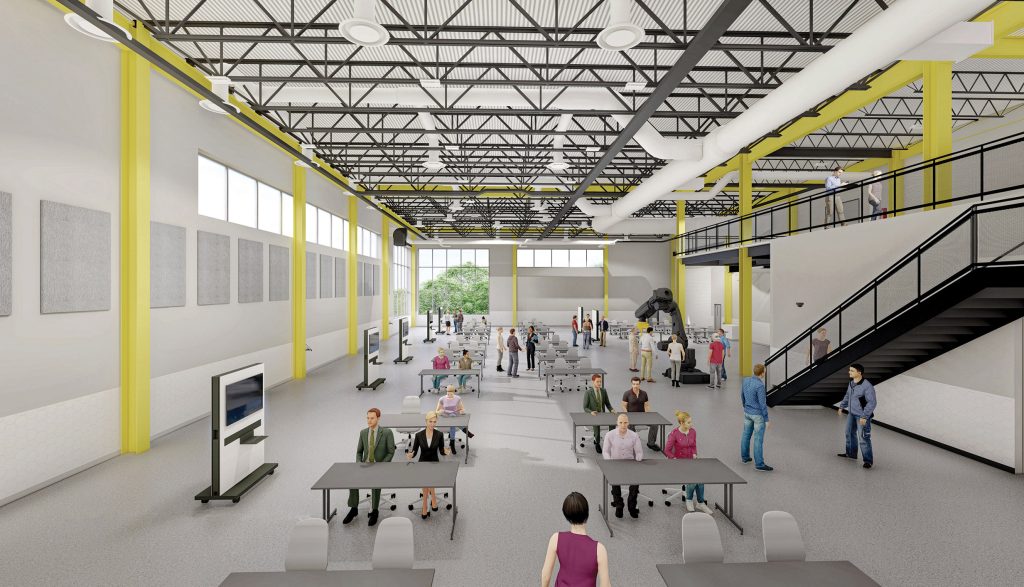
The state-of-the-art polytechnic center will feature project- based learning and non-traditional, hands-on collaborative work environments and flex labs where business and industry can partner on developing projects and ideas.
▪ STEAM
STEAM education adds the arts to the traditional STEM foundation (Science, Technology, Engineering and Mathematics) as the integrated approach to learning at a polytechnic institution, which guides students’ learning and opens their minds to the world around them. By incorporating the arts, STEAM embraces creativity, collaboration, critical thinking and communication, thereby nurturing curiosity and innovation.
To ensure students are well-rounded and more marketable to employers, BSC focuses on giving students a solid foundation in STEAM, and the concepts from STEAM disciplines are woven throughout programs to align with business and industry demands. One example of science intersecting with the arts within a program would be to offer a theatre course specific for health care students, which is under consideration. The course would provide students opportunities to role-play different scenarios they might encounter with patients. All BSC programs—not just the technical programs—have a polytechnic influence, and faculty are incorporating STEAM education into their curriculum to help students develop highly employable skills in career-specific forms such as leadership, initiative, entrepreneurship, reliability, planning and organizing, critical thinking, problem-solving, communication and teamwork.
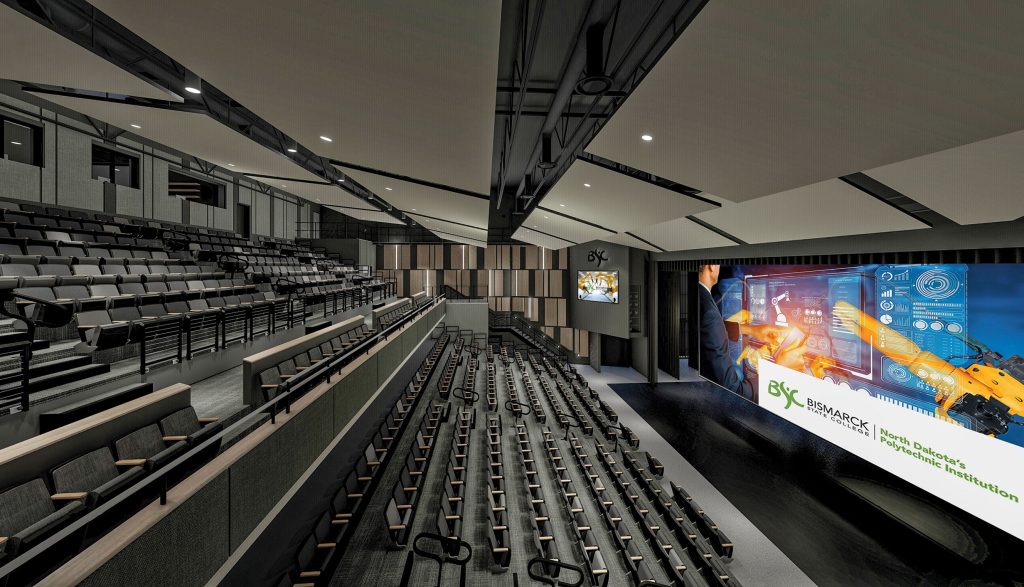
The live-event venue is a versatile space that can be transformed for music and theatrical productions, class or community presentations, industry collaborations and much more.
▪ Industry 4.0
Today’s students need to be trained in the ever- advancing digital technology that automates and improves business practices. The resulting transformations in business and industry—including the integration of increased automation, improved communication, and the production of smart machines that can analyze and diagnose issues without human intervention—is known as Industry 4.0, meaning the Fourth Industrial Revolution.
When computers were introduced into Industry 3.0, it was disruptive. Industry 3.0 was a giant leap ahead as the advent of computers and automation meant more robots were used to perform tasks previously performed by humans.
Today, the combination of cyber-physical systems, such as smart grids, autonomous automobiles, AI and the Internet of Things makes Industry 4.0 possible. The growing network of digitally interconnected smart machines creates and shares information, enabling business and industry to minimize waste and become more efficient and productive. This is the true power of Industry 4.0.
The Fourth Industrial Revolution differs from prior ones due to digitization’s ongoing penetration into business and industrial operations, significantly increasing interconnectivity. Industry 4.0 standards are being integrated into all occupations in the workforce, and students must be equipped with the appropriate knowledge and skill sets. As a polytechnic institution, BSC ensures students meet these standards by embedding them into their curriculum and educational experience, whether in
the classroom or experiential learning environments. Students graduate knowing how these automated processes work within their field and can adapt to the changes and improvements they bring.
Although Industry 4.0 will eliminate many jobs, especially highly repetitive tasks, it simultaneously creates many more new career pathways. The World Economic Forum’s “The Future of Jobs Report 2020” predicted that by 2025, AI will replace 85 million current jobs worldwide—but create 97 million new jobs as all digital technologies require people with the right skills to conceive, build, program, maintain and repair.
▪ Expert Faculty
Just as professors at colleges and universities, faculty members at polytechnic institutions, including BSC, have earned master’s and doctoral degrees. The polytechnic advantage is that instructors also come to the classroom with many years of industry experience and credentials, meaning that BSC students gain valuable knowledge from career professionals in an applied-learning, project-based classroom environment.
▪ Applied Research
Research conducted at universities tends to be based on theory and knowledge-sharing. Since polytechnic institutions engage and develop meaningful partnerships with industry leaders and stakeholders, BSC’s research projects are designed to solve industry-specific, work-based problems, and the findings can be used to develop industry standards and processes and establish technical improvements that support industry growth and development.
▪ Driven by Industry
As the state’s only polytechnic institution, BSC is uniquely positioned to connect and engage with business and industry leaders to identify workforce needs and quickly respond with programs, certificates and even non-credit courses. At the core of BSC’s polytechnic education model are 12 Business and Industry Leadership Teams (BILTs). The BILTs teams are composed of business and industry stakeholders who provide BSC with strategic advice and feedback on industry trends and the knowledge, skills and abilities required in future high-demand careers. This direct input influences the development of curriculum, program pathways and services.
“We’ve created BILTs made up of executive-level representation from local and state government, economic development entities, public education and regional business and industry to provide BSC advisory support,” explained Alicia Uhde, BSC’s Dean of Automation, Energy and Advanced Technologies.
As the state’s only polytechnic institution, BSC is uniquely positioned to connect and engage with business and industry leaders to identify workforce needs and quickly respond with programs, certificates and even non-credit courses.
BSC has always responded to workforce needs with this industry-focused approach to education, which includes programs for specific skill sets and advanced training to benefit industry’s current employees. Becoming a polytechnic institution has deepened and intensified this marriage of education and industry.
“There are more than 2,400 open jobs in Burleigh and Morton counties, and the positions are not all in one field or another. They are spread across blue-collar and white-collar industries alike,” said Brian Ritter while serving as President and CEO of the Bismarck Mandan Chamber Economic Development Council. “BSC’s evolution into a polytechnic institution enables us to address the community’s workforce needs in a way that we’ve never been able to do in the past.”
Because of their polytechnic-focused education, BSC students graduate workforce ready with the most up-to-date skills. They also benefit from the school’s high employment rate due to BSC’s focus on programs for high-priority, well-paying occupations.
▪ Career Pathways in K-12
“I certainly believe that our partnership with Bismarck State College has greatly benefited Bismarck Public School students over the years, by allowing them to earn credits toward post- secondary certifications and degrees in career and technical education pathways while still in high school,” said Dale Hoerauf, Bismarck Public Schools Director of Career and Technical Education. “This has been evident in the success of our Electronics articulation agreement and Med Terminology dual credit programs, to name a few. It is a win/win for students to be able to learn at their pace and receive post-secondary and industry-recognized microcredentials.”
In partnership with K-12, BSC recently developed a Mobile App Development certificate and a Cybersecurity Fundamentals certificate, and both are available to students as early as sophomore year of high school. These are examples of certificates that can be “stacked” as college credits toward associate and bachelor’s degrees.
“As the costs and debt associated with higher education continue to be prohibitive for many students and their families, offering college credit for career and technical education in high school provides a gateway to higher paying jobs, especially with companies actively looking to fill highly skilled positions,” Uhde said. “These certifications are hands-on education that not only provide highly technical skills but also improve students’ teamwork, problem-solving and communication skills.”
Recently, BSC focused on expanding career pathways for high school students by increasing Dual Credit and Early Entry opportunities. The additional classes and certificates have resulted in a 46 percent increase in Dual Credit/Early Entry enrollments from fall 2021 to fall 2022 and a 108 percent increase from spring 2022 to spring 2023. And in May 2023, 41 students were classified as both full-time high school and college students, and eight graduated with a degree from BSC before receiving their high school diplomas.
“Dual credit fits perfectly within our unique polytechnic education model and offers students flexibility and opportunity. It is very possible for these 41 dual credit students taking a full college course load to graduate with their associate degree from BSC at the same time that they graduate from high school if they continue on this path,” said Dan Leingang, BSC’s Vice President for Academic Affairs. “This not only saves them time and money, it also puts them further ahead when they enter college and closer to meeting their career goal.”
Career pathway expansion into K-12 will continue to be a focus of BSC’s polytechnic education model.
Enrollment Growth
BSC recorded a 20.19 percent enrollment increase for the Spring 2023 semester, topping the fall enrollment, which had increased by 6.2 percent, for the same academic year (2022-23) for the first time in more than 10 years. Then BSC saw an 8 percent increase for the Fall 2023 semester (4,065 students in total). The freshman class increased by 9 percent (2,433 students) to become the largest freshman class among the 11 institutions in the North Dakota University System (NDUS).
These statistics certainly go against enrollment trends in higher education, both in North Dakota and nationwide, and BSC believes this is the result of both an increased need for a skilled workforce and how the polytechnic model offers career pathways and flexible education options tailored to meet students’ educational and career goals.
During the 2022-23 academic year, BSC also saw a 108 percent increase in dual credit enrollment. The five programs seeing the highest enrollment growth in Spring 2023 include Medical Laboratory Technician (45 percent), Electric Power Technology (41.75 percent), Agriculture Industry and Technology (34.29 percent), Cybersecurity & Computer Networks (22.13 percent) and Surgical Technology (24 percent).
Looking ahead, BSC anticipates enrollment will keep increasing as the polytechnic institution adds new academic programs in high-demand fields, such as agriculture, cybersecurity, energy, health sciences, manufacturing and automation.
What’s in a Name?
As North Dakota’s Polytechnic Institution, BSC prepares students to be workforce ready right out of college. Hands-on learning from industry trained faculty in unique education environments; the incorporation of STEAM and Industry 4.0 standards into curriculum, driven by industry experts; flexible learning pathways; internships with industry partners; and applied research opportunities, all together put students on a direct path to successful careers. ◙
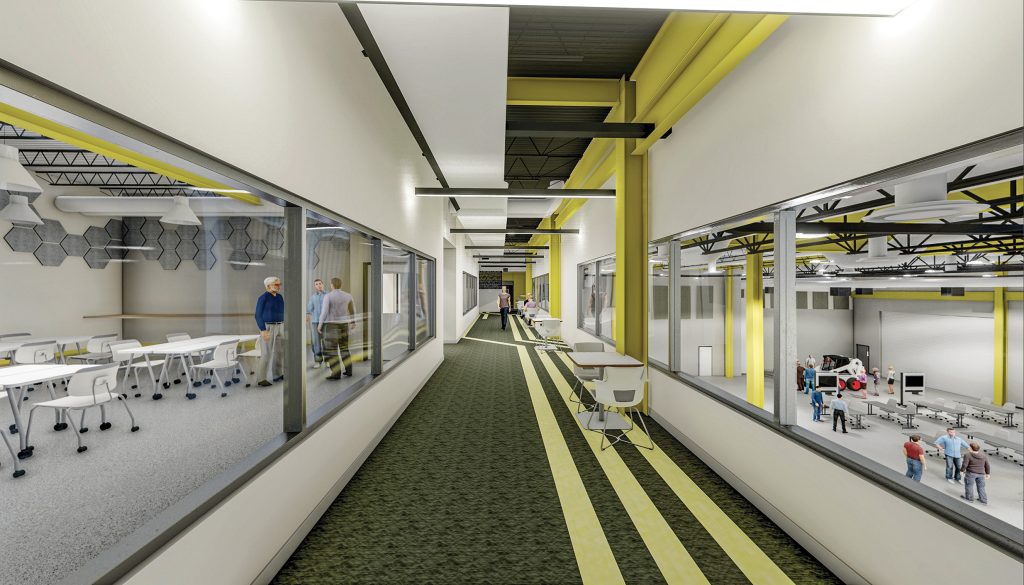
Upper-level hallway at BSC’s polytechnic education center with collaborative rooms on the left and the flex lab, shown on page 15, seen from above.
Douglas J. Jensen, EdD, became the seventh president of Bismarck State College in 2020 and is leading the college’s transition to North Dakota’s polytechnic institution. Bringing more than 25 years of community college leadership to BSC, Jensen previously served as president at Rock Valley College, and president/chief executive officer at the Alabama Technology Network in the Alabama Community College System. He served as vice president of economic development/chief executive officer for the Advanced Technology Center at Westmoreland County Community College, and as chief academic officer and vice president of learning at Northcentral Wisconsin Technical College in Wausau, WI. Jensen also served in the roles of academic dean and academic associate dean at Northeast Wisconsin Technical College in Green Bay, WI, and assistant dean, director of business and industry training, director of job readiness and director of student support services at the Community College of Allegheny County. Jensen earned an Associate of Science from the Community College of Allegheny County, a Bachelor and a Master of Science from Geneva College, and a Doctorate of Education from Edgewood College
